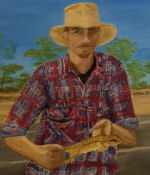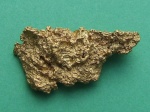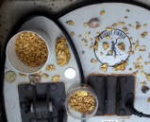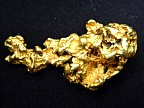Plants growing around gold deposits
+11
twobit
maka
Axeman
triffid
silwane
Tributer
Chuckles
geof_junk
the speciman
GoldstalkerGPX
Nature_Pete
15 posters
Page 1 of 2
Page 1 of 2 • 1, 2 
 Plants growing around gold deposits
Plants growing around gold deposits
G'day all,
I have heard that some native plants can be used as indicators for areas that may contain gold bearing ground. Having a decent knowledge of native plants, can anyone suggest to me any species to keep an eye out for? I'm not sure wether it is related to mineralisation of the soil or acidity/alkalinity etc. Yes, it is a serious question and I am happy for anyone to respond. I may be completely off the track with this one, but it never hurts to ask. I don't mind latin names or common names.
I'm not sure wether it is related to mineralisation of the soil or acidity/alkalinity etc. Yes, it is a serious question and I am happy for anyone to respond. I may be completely off the track with this one, but it never hurts to ask. I don't mind latin names or common names.
Cheers,
Nature Pete.


I have heard that some native plants can be used as indicators for areas that may contain gold bearing ground. Having a decent knowledge of native plants, can anyone suggest to me any species to keep an eye out for?
Cheers,
Nature Pete.

Nature_Pete- Contributor Plus

- Number of posts : 255
Registration date : 2011-03-09
 Re: Plants growing around gold deposits
Re: Plants growing around gold deposits
.
Last edited by fencejumper on Sun Aug 12, 2012 10:28 pm; edited 1 time in total
Guest- Guest
 Re: Plants growing around gold deposits
Re: Plants growing around gold deposits
I dunno about the peppercorn trees, I don't think they are native and were usually planted around the old houses, they would be a good indicator for relic/coin detecting I reckon.
Those thick "reeds" I think are called lillys of some kind in VIC, and because they grow so thick and its hard to get the coil close to the ground in amongst them you still get gold.
Another is the native "Cherry tree" in VIC, these like the bit deeper pockets of ground on the slopes and the gold also likes to accumulate in these deeper pockets.
Iv'e been told that some species of grasses produce cyanide which can help to attract fine gold, not sure wheather this one is correct though.
cheers dave
Those thick "reeds" I think are called lillys of some kind in VIC, and because they grow so thick and its hard to get the coil close to the ground in amongst them you still get gold.
Another is the native "Cherry tree" in VIC, these like the bit deeper pockets of ground on the slopes and the gold also likes to accumulate in these deeper pockets.
Iv'e been told that some species of grasses produce cyanide which can help to attract fine gold, not sure wheather this one is correct though.
cheers dave
Guest- Guest
 Re: Plants growing around gold deposits
Re: Plants growing around gold deposits
.
Last edited by fencejumper on Sun Aug 12, 2012 10:30 pm; edited 1 time in total
Guest- Guest
 Re: Plants growing around gold deposits
Re: Plants growing around gold deposits
All good advice above, grasses can give an indication, flax (not sure of spelling) grass may indicate a shallow depression in the ground that has filled with wash or top soil that is worth checking.
Large trees ie ironbarks may also indicate deep ground and also smaller shrubs etc may well indicate shallow ground. vegetation and trees are a very good indicator of ancient gullies or rivers. Many of the flora indicators will indicate highly mineralised ground as suggested.
Large trees ie ironbarks may also indicate deep ground and also smaller shrubs etc may well indicate shallow ground. vegetation and trees are a very good indicator of ancient gullies or rivers. Many of the flora indicators will indicate highly mineralised ground as suggested.

GoldstalkerGPX- Contributor Plus

- Number of posts : 1732
Age : 100
Registration date : 2009-07-27
 Re: Plants growing around gold deposits
Re: Plants growing around gold deposits
YE GDAY ALL
we here in the pilbarra have certain plants that grow around gold bearing areas its called spinefex
good scratchin
cheers the speciman
we here in the pilbarra have certain plants that grow around gold bearing areas its called spinefex
good scratchin
cheers the speciman
the speciman- Contributor Plus

- Number of posts : 255
Registration date : 2010-12-19
 Re: Plants growing around gold deposits
Re: Plants growing around gold deposits
.
Last edited by fencejumper on Sun Aug 12, 2012 10:29 pm; edited 1 time in total
Guest- Guest
 Re: Plants growing around gold deposits
Re: Plants growing around gold deposits
Hi guys,
Thank you so much for your replies


It does make alot of sense the way that you describe them and where they grow, but more why they grow there. I have to ask though, the 'native cherry' I am thinking of is the 'Cherry Ballart' (maybe?). I'll post a pic and see if it is the same plant that you are speaking of.
Cheers,
Nature Pete.



Thank you so much for your replies
It does make alot of sense the way that you describe them and where they grow, but more why they grow there. I have to ask though, the 'native cherry' I am thinking of is the 'Cherry Ballart' (maybe?). I'll post a pic and see if it is the same plant that you are speaking of.
Cheers,
Nature Pete.


Nature_Pete- Contributor Plus

- Number of posts : 255
Registration date : 2011-03-09
 Re: Plants growing around gold deposits
Re: Plants growing around gold deposits
.
Last edited by fencejumper on Sun Aug 12, 2012 10:30 pm; edited 1 time in total
Guest- Guest
 Re: Plants growing around gold deposits
Re: Plants growing around gold deposits
Looks like the bush-cherry some call it aussy xmas tree. Seem to be associated to gold in vic triangle

geof_junk- Contributor Plus

- Number of posts : 938
Registration date : 2008-11-11
 Re: Plants growing around gold deposits
Re: Plants growing around gold deposits

The Native Cherry tree (Exocarpus cupressiformis) or Cherry Ballart is parasitic and will usually be found near a Eucalypt or other tree it can feed off when it is young.
When I was a young bloke I was told by an old timer in Castlemaine that it quite often meant there was gold nearby.
The fruit is red when ripe ..thus the name Cherry tree.

I haven't found gold in Vic near one of these trees but I did when I lived in the the Araluen Valley in Southern NSW...they were a good indicator in that location.
Chuckles- Contributor

- Number of posts : 64
Registration date : 2011-05-09
 Re: Plants growing around gold deposits
Re: Plants growing around gold deposits
Thank you so much guys for the great responses. It explains to me what I have been looking at in different areas and really acts as a great starting point. It is funny to look at it as a gold bearing ground possibility rather than conservation, but with the plants and trees that you have mentioned, like flax lillys and Ironbarks, I can understand where the properties relate back.
Thank you again,
Nature Pete.


Thank you again,
Nature Pete.

Nature_Pete- Contributor Plus

- Number of posts : 255
Registration date : 2011-03-09
 Re: Plants growing around gold deposits
Re: Plants growing around gold deposits
Hi Nature Pete, I like looking for natural traps/bedrock traps where gold might be held up and have never really used plants as an indicator except to judge on ground/bedrock depth and hollows. However the topic of indicator plants for gold and many other minerals is interesting and i have read a little on it. Geobotany is used by some mining companies and especially the use of false colour imagery from aerial photography to pick up discolouration in plant leaves that indicates the presence of minerals. Plenty of serious work has been done. Have not looked on the web lately for it but there was heaps on the science when i last looked.
Tributer
Tributer

Tributer- Contributor Plus

- Number of posts : 1006
Registration date : 2008-10-27
 Re: Plants growing around gold deposits
Re: Plants growing around gold deposits
Hi all,
The tree in the pic is quite possibly a cheery tree and the reason for the growth to be so low on that particular tree would indicate that the animals haven't been browsing on the limbs of this individual. As most Cheery tree's you usually encounter out in the hills will have been eaten back to around the height of what ever animal has been using it as an occasional food source can reach. You will quite often see these tree's, in around the high country especially, with the trunks rubbed back indicating presence of deer in the area who love these tree's.
Cheers,
Paul
The tree in the pic is quite possibly a cheery tree and the reason for the growth to be so low on that particular tree would indicate that the animals haven't been browsing on the limbs of this individual. As most Cheery tree's you usually encounter out in the hills will have been eaten back to around the height of what ever animal has been using it as an occasional food source can reach. You will quite often see these tree's, in around the high country especially, with the trunks rubbed back indicating presence of deer in the area who love these tree's.
Cheers,
Paul

silwane- Good Contributor

- Number of posts : 95
Registration date : 2011-03-22
 Here in the USA
Here in the USA
I have read that cattails will concentrate gold atoms in their tissues .So if gold is present in the soil they are growing in.Then there is a certain number of grams of gold per ton of dry weight.I do not recall that number.Does anyone here know that number?Thanks in advance.Triffid
triffid- New Poster

- Number of posts : 8
Registration date : 2011-09-04
 johnson grass
johnson grass
The poisonous constituent of Johnsongrass is cyanide, a most lethal toxin that can kill a fully grown cow in an hour if enough forage is consumed. Johnsongrass tends to produce cyanide whenever it is stressed as by drought, insect infestation or frost. If Johnsongrass is cut at the proper stage and cured correctly, it can be safely used for hay.triffid
triffid- New Poster

- Number of posts : 8
Registration date : 2011-09-04
 Re: Plants growing around gold deposits
Re: Plants growing around gold deposits
The favorite rumour getting around the old timers i've met is grass trees or blackboys. I've heard this from seven of them so far. Mind you some of them know each other so it could just be a local romour spread whilst drinking beer  .
.

Axeman- Contributor

- Number of posts : 48
Age : 58
Registration date : 2010-09-05
 Re: Plants growing around gold deposits
Re: Plants growing around gold deposits
Great read. Its probably a good stating point, thats for sure...
ironbarks??? that narrows it down to the whole east coast... ( true as far as the gold goes)
Blackboys/grass trees.... never had any luck around them, but in saying that the local area i live has a clump of them high in a mountain, and going from turn of the century reports there was a gold mine up there that did actually produce gold...
If you read about blackboys the have a relationship with a microbe i think that lives around its roots.. They cant live without eachother..
Makes me think,,, the soil type has to be right for them both to survive,,,, soooo is it mineralised soil? I do know they like the grey looking sandy loamy soil... and brown sugar if you transplant one...
Next time i am bored i am going to spend little more time checking out the grass tree myth.
The iron barks in this area i cant myth bust as every back yard has them, lol...
Maybe the old river gums would be a better proposition around this area... they are few and far between..
maybe is was more comfortable to dig under the shade of a tree, hence the odds are better at finding gold obviously where you dig..
I know by mid day i head for tree lines for a swing as its much nicer in the shade,,, do the creeks in the middle of summer, and the beaches..
ironbarks??? that narrows it down to the whole east coast... ( true as far as the gold goes)
Blackboys/grass trees.... never had any luck around them, but in saying that the local area i live has a clump of them high in a mountain, and going from turn of the century reports there was a gold mine up there that did actually produce gold...
If you read about blackboys the have a relationship with a microbe i think that lives around its roots.. They cant live without eachother..
Makes me think,,, the soil type has to be right for them both to survive,,,, soooo is it mineralised soil? I do know they like the grey looking sandy loamy soil... and brown sugar if you transplant one...
Next time i am bored i am going to spend little more time checking out the grass tree myth.
The iron barks in this area i cant myth bust as every back yard has them, lol...
Maybe the old river gums would be a better proposition around this area... they are few and far between..
maybe is was more comfortable to dig under the shade of a tree, hence the odds are better at finding gold obviously where you dig..
I know by mid day i head for tree lines for a swing as its much nicer in the shade,,, do the creeks in the middle of summer, and the beaches..

maka- Contributor Plus

- Number of posts : 626
Registration date : 2011-06-28
 microbes like bacteria are plants too!
microbes like bacteria are plants too!
Read what this article says about bacteria concentrating gold out of seawater! http://goldfever.com/gold_sea.htm
More going on than you ever knew!
More going on than you ever knew!
triffid- New Poster

- Number of posts : 8
Registration date : 2011-09-04
 More from the article I posted a link to about bacteria!
More from the article I posted a link to about bacteria!
Other theories have been proposed regarding the role of gold precipitation from ore solutions by bacteria. Recent evidence suggests that most of the placer gold found in Alaska originated from bacterial scavenging. An analysis of the microstructure of Alaskan placer gold, and that of many of the epithermal deposits around the world, has revealed a fine structure of nearly pure gold microtubuals approximately 1 micrometer in diameter. It has been proposed that these hollow gold structures are the exact shape and size of the cellwall of bacterium genus Pedomicrobia (Watterson 1992). These bacteria are believed to derive energy from the precipitation of gold around themselves. A close examination of the microtubuals reveals branching structures of smaller diameters connected to the larger diameters. This observation is remarkable similar to the observed method of reproduction for Pedomicrobia. Instead of reproducing my fission, the splitting of the cell in two, these bacteria often reproduce by budding, a process remarkable similar in appearance to the gold microtubuals (Rennie 1992). The gold casings around the Pedomicrobia are extraordinary because of their high degree of purity, in excess of 98% gold (Pain 1988). It has been argued by these researchers that much of the Earth's placer gold deposits, have originated from similar biological processes with these or other bacteria. It is believed that the bacteria can concentrate the gold around themselves in such massive amounts because of an electrochemical reaction whereby the gold is gathered on pecifically adapted membrane receptors to which the bacteria discharges excess electrons from its biological processesthus precipitating the gold out of solution (Watterson 1992).
triffid- New Poster

- Number of posts : 8
Registration date : 2011-09-04
 The conclusion from the article I posted a link to.
The conclusion from the article I posted a link to.
Conclusion:
Even at the conservative estimates of 10 ppt of gold in seawater, there is a great deal of gold in solution in the oceans. Humankind has unearthed perhaps a total of 3.3 billion ounces of gold over the course of history, an amount equivalent To a cube of gold 55 feet on a side (Dworetzky 1988), but the sea water of the Earth's oceans contain about 25 billion ounces of gold (Burk 1989). If the ability of some of these bacteria to concentrate gold around their cell membranes to the degree that they form massively dense agglomerations of hollow gold microtubuals, as the evidence suggests, then perhaps a similar bacterium may find a practical application in sea water. It is believed that these bacteria concentrated gold from solution concentrations similar to that of sea water, though perhaps not similar with regard to other constituents. If such a bacterium could be identified and grown in sufficient amounts, it might then be fixed to substrates that could then either be moved through large volumes of sea water, or placed in stationary positions in areas of relatively swift currents. Once enough time had elapsed for these bacteria to gather sufficient amounts of gold, these substrates could then be gathered and processed to recover the gold. The problems in these approaches are not trivial, and the work and research needed for an evaluation of its practicality are not simple. I believe that such research might pursue exploring the precise biochemical and bioelectrical pathways for the deposition of gold in these naturally occurring bacteria. Perhaps with a sufficient understanding of these pathways, these gold scavenging abilities might be artificially promoted or enhanced sufficiently to achieve an economic recovery of gold from sea water.
Even at the conservative estimates of 10 ppt of gold in seawater, there is a great deal of gold in solution in the oceans. Humankind has unearthed perhaps a total of 3.3 billion ounces of gold over the course of history, an amount equivalent To a cube of gold 55 feet on a side (Dworetzky 1988), but the sea water of the Earth's oceans contain about 25 billion ounces of gold (Burk 1989). If the ability of some of these bacteria to concentrate gold around their cell membranes to the degree that they form massively dense agglomerations of hollow gold microtubuals, as the evidence suggests, then perhaps a similar bacterium may find a practical application in sea water. It is believed that these bacteria concentrated gold from solution concentrations similar to that of sea water, though perhaps not similar with regard to other constituents. If such a bacterium could be identified and grown in sufficient amounts, it might then be fixed to substrates that could then either be moved through large volumes of sea water, or placed in stationary positions in areas of relatively swift currents. Once enough time had elapsed for these bacteria to gather sufficient amounts of gold, these substrates could then be gathered and processed to recover the gold. The problems in these approaches are not trivial, and the work and research needed for an evaluation of its practicality are not simple. I believe that such research might pursue exploring the precise biochemical and bioelectrical pathways for the deposition of gold in these naturally occurring bacteria. Perhaps with a sufficient understanding of these pathways, these gold scavenging abilities might be artificially promoted or enhanced sufficiently to achieve an economic recovery of gold from sea water.
triffid- New Poster

- Number of posts : 8
Registration date : 2011-09-04
 using bacteria to extract gold from pyrite(fools gold).
using bacteria to extract gold from pyrite(fools gold).
The possibility that certain bacteria can concentrate gold in amounts sufficient to comprise a major share of the Earth's gold ores suggest that with the right application, these or similar bacteria may be employed in the extraction of gold from low grade deposits or solutions. Already, there are commercial applications of bacteria in the mining of gold. Specifically, the bacteria Bacillus cereus is being used by the Canadian Genprobe Company to increase the yield of gold from pyrite ores (Anonymous 1989). In this case the bacteria are after the pyrite matrix that binds the gold and prevents economic recovery otherwise. Bacterial processing of these pyrite ores is relatively inexpensive and has increased yields from an average of about 65% to as much as 96% (Dworetzky 1988). Given the affinity that some bacteria have for the concentration of gold, the question arises as to whether it might be feasible to employ such a bacterium, or one specifically engineered for the task, to scavenge gold directly from the dilute concentrations present in sea water.

triffid- New Poster

- Number of posts : 8
Registration date : 2011-09-04
 Re: Plants growing around gold deposits
Re: Plants growing around gold deposits
There is a tree in the triangle (I dont know if its the cherry tree (possibly casurina))that has leaves like pine needles.Nothing grows under it because of the needles it drops.These trees area a great indicator of ironstone reefs and when you see them growing in a line the reef is below them.
Reeds and rushes on the slopes show inundations where water collects and where gold can collect.
The ring of gravels around the base of trees is dragged from the bottom up by growth of the tree.So this can show you whats under you feet.Study the base of the trees and it will give you an idea of which way the gravels are flowing,its a great way of knowing whats beneath you.When the gravels disappear at the base of the trees the ground is generally too deep for detecting.
Cheers Dig
Reeds and rushes on the slopes show inundations where water collects and where gold can collect.
The ring of gravels around the base of trees is dragged from the bottom up by growth of the tree.So this can show you whats under you feet.Study the base of the trees and it will give you an idea of which way the gravels are flowing,its a great way of knowing whats beneath you.When the gravels disappear at the base of the trees the ground is generally too deep for detecting.
Cheers Dig
Last edited by Dig24crt on Tue Sep 27, 2011 3:50 pm; edited 1 time in total (Reason for editing : typo)
Guest- Guest
 More
More
Plants can be used to find gold deposits sometimes. http://econgeol.geoscienceworld.org/cgi/content/abstract/74/4/902 In Australia there are certain trees which seem to grow in areas of gold deposits. Sometimes its the gold uptake but sometimes it is areas of faults because more water accumulates and hence brings the gold into that area…
triffid- New Poster

- Number of posts : 8
Registration date : 2011-09-04
 bacteria make gold nuggets!
bacteria make gold nuggets!
http://news.discovery.com/earth/gold-bacteria-nuggets.html
Gold nuggets are often the creations of bacterial biofilms, say Australian researchers who have demonstrated the process and even identified the bacteria at work.
Layers of bacteria can actually dissolve gold into nanoparticles, which move through rocks and soils, and then deposit it in other places, sometimes creating purer "secondary" gold deposits in cracks and crevices of rocks. The process overturns the long-held belief by some scientists that gold ore is created only by "primary" physical geological processes.
Gold nuggets are often the creations of bacterial biofilms, say Australian researchers who have demonstrated the process and even identified the bacteria at work.
Layers of bacteria can actually dissolve gold into nanoparticles, which move through rocks and soils, and then deposit it in other places, sometimes creating purer "secondary" gold deposits in cracks and crevices of rocks. The process overturns the long-held belief by some scientists that gold ore is created only by "primary" physical geological processes.
triffid- New Poster

- Number of posts : 8
Registration date : 2011-09-04
 Re: Plants growing around gold deposits
Re: Plants growing around gold deposits
2 words "She Oaks"
^^^^^^
Thats actually 3 words and a number, lol
Plenty of references when you start looking.
From Aust to the USA.
^^^^^^
Thats actually 3 words and a number, lol
Plenty of references when you start looking.
From Aust to the USA.

maka- Contributor Plus

- Number of posts : 626
Registration date : 2011-06-28
 Re: Plants growing around gold deposits
Re: Plants growing around gold deposits
Industrial Diamonds??, looks for wattle trees...

maka- Contributor Plus

- Number of posts : 626
Registration date : 2011-06-28
 Re: Plants growing around gold deposits
Re: Plants growing around gold deposits
The young cones are edible, and so is some of the sap.
Please dont eat them unless u research it yourself...
I believe the chinese ate these and / or the husk, and the plants have germinated from them passing, dropping, the seeds.
A fair few gold regions worked by the chinese have she oaks.
Good parrot food also, so they would drop them when drinking etc, so in theory they should grow in the lowest part of the creek or valley, maybe just coincidental thats where the gold should lay...
Please dont eat them unless u research it yourself...
I believe the chinese ate these and / or the husk, and the plants have germinated from them passing, dropping, the seeds.
A fair few gold regions worked by the chinese have she oaks.
Good parrot food also, so they would drop them when drinking etc, so in theory they should grow in the lowest part of the creek or valley, maybe just coincidental thats where the gold should lay...

maka- Contributor Plus

- Number of posts : 626
Registration date : 2011-06-28
 Re: Plants growing around gold deposits
Re: Plants growing around gold deposits
gees maka your wealth of tree tucker astounds me 
I always like to look for ironbark
I always like to look for ironbark
twobit- Contributor

- Number of posts : 67
Registration date : 2011-08-14
 Re: Plants growing around gold deposits
Re: Plants growing around gold deposits
I often follow the wild cherry lines which grow in straight line in uncleared bush. They can indicate ironstone like reefs which can be hard to notice. They are of most interesting where they intersect other indicating features.
The wild cherry seems to come up where the ground has been disturbed in the past near roads/earthworks, I heard once that it has something to do with damaged tree roots in this disturbed ground.
Also i've had some luck around the little Hakea Bush, not sure what it's proper name it is but is dark green and covered in little spikes. Grows to around 1m tall and can grow near reef gold in shallow ground.
Keep a eye out for wild flowers that will grow in high numbers in bands on some mineralized quartz reefs.
Lazy Tom
The wild cherry seems to come up where the ground has been disturbed in the past near roads/earthworks, I heard once that it has something to do with damaged tree roots in this disturbed ground.
Also i've had some luck around the little Hakea Bush, not sure what it's proper name it is but is dark green and covered in little spikes. Grows to around 1m tall and can grow near reef gold in shallow ground.
Keep a eye out for wild flowers that will grow in high numbers in bands on some mineralized quartz reefs.
Lazy Tom
Guest- Guest
Page 1 of 2 • 1, 2 
 Similar topics
Similar topics» Is gold growing on trees. Advertiser 20 sept
» Gold deposits of New Zealand
» Does anyone know of any gold deposits west of the Grampians?
» THE GOLD DEPOSITS OF MOUNT LEYSHON
» Natural Gold Movement And Deposits
» Gold deposits of New Zealand
» Does anyone know of any gold deposits west of the Grampians?
» THE GOLD DEPOSITS OF MOUNT LEYSHON
» Natural Gold Movement And Deposits
Page 1 of 2
Permissions in this forum:
You cannot reply to topics in this forum